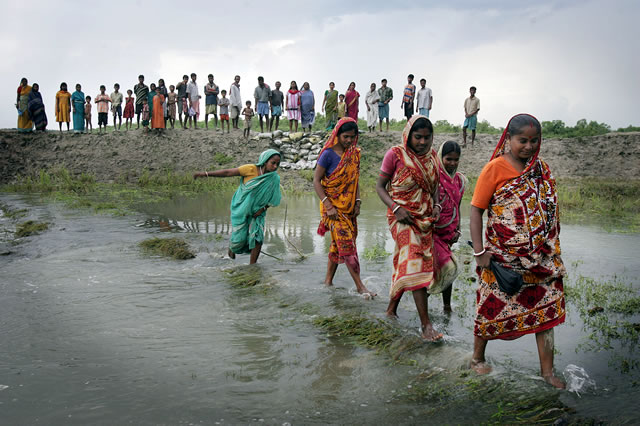Following on from the success of the Climate Change lecture series 2007-2009 hosted by the Environmental Protection Agency (EPA), the Foundation President Mary Robinson delivered a public lecture Tuesday titled: Re-shaping the debate on climate change.
Re-shaping the debate on climate change
Following on from the success of the Climate Change lecture series 2007-2009 hosted by the Environmental Protection Agency (EPA), the Foundation’s President Mary Robinson delivered a public lecture Tuesday titled: Re-shaping the debate on climate change [8 pages, 560kb].
Speaking before the event, Dr Mary Kelly, Director General, EPA said “Climate Change is acknowledged as one of the most serious threats facing humanity. Responsibility for dealing with this threat falls to this generation. It would be easy to lose sight of climate change objectives at this time of economic crisis for the Irish economy.
“We must not let this happen and we must ensure that when economic growth returns it is a low carbon growth based on a sustainable model for the economy and for the environment.”
Approximately 800 people filled the Round Room in the Mansion House in Dublin for the session chaired by RTÉ broadcaster John Bowman. Echoing Dr. Kelly’s sentiments, Mary Robinson’s lecture focused on reshaping the debate on climate change to focus on justice in the developing world and how addressing the issue of climate change must address the issue of justice also:
“In hard times it can be difficult to attend to the long term. When recession and debt pose urgent constraints, ten-year targets and fifty-year plans may appear a luxury. Climate change can appear far away, in both time and space. And yet, of course, it is not far away, it is not merely a ‘long-term’ problem. Climate change is what we are doing right here and right now.”
“What is crystal clear”, noted Mary Robinson, “is that, from now on, the wellbeing of those in richer and poorer countries is intimately related… it is not enough for me to realise that my carbon-saturated life here today has in part caused the climate refugee fleeing her flooded home in Bangladesh tomorrow. I must also recognise that if she is to be denied access to carbon-fuelled economic growth, I must also, surely, be obliged to provide her some substitute form of wherewithal.”
A robust Q&A session followed Mary Robinson’s address, which covered a wide range of topics including:
- The pros and cons of carbon credits:
Mary Robinson noted that carbon credits run the risk of becoming just an easy way of letting certain companies or countries ‘off the hook’ to continue polluting – but there are potential benefits if such a system is implemented responsibly. - Population control
Careful discussion needs to take place on this issue. Mary Robinson cited Rwanda as a model of how the introduction of family planning education placed an emphasis on educating women and girls. - US mid-term elections
Over half of the U.S. House of Representatives are ‘climate change deniers’. Mary Robinson affirmed however that there are ‘green shoots’ with leaders like Jerry Brown in California. Meanwhile, the emerging economies of Brazil, China and India are taking a lead in developing new opportunities for green technologies. - Mobile Technology
Mary Robinson detailed how the mobile phone is one of the most productive instruments in the hands of poor Africans. There is massive potential if this can be coupled with affordable energy.As part of its programme of increasing public awareness of climate change issues, the EPA has hosted a number of lectures on this topic. The speakers include international experts who discussed key aspects of climate change, including the basic science, predictions, impacts and options for actions to deal with this global challenge. With the permission of the invited speakers, each lecture was recorded live. Watch previous lectures on the dedicated video player.
Further Reading:
Robinson warns against failing to address global warming – Irish Times, 25 Nov. 2010


